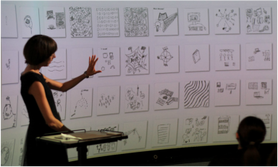Biography
|
Jenna Hartel received a Doctorate of Philosophy in Information Studies from the Department of Information Studies at the University of California, Los Angeles (2007). As a child, she had an uncommon enjoyment of information, realized in a love of reading, keeping diaries, and writing letters. Today, her research is organized around the question: What is the nature of information in the pleasures of life? She is investigating this matter through the concatenated study of information phenomena in serious leisure -- cherished, information-rich pursuits such as hobbies. Her empirical research explores the content, structure, and use of leisure information on personal and social levels, and her theoretical work aims to characterize the nature of information in leisure realms. She has published on these topics in JASIS&T, Journal of Documentation, Knowledge Organization, and Information Research; and she is the author of the article “Leisure and Hobby Information and its User” for the Encyclopedia of Library and Information Sciences (2010).
|
The Research & Publications page contains many links or PDFs for full-text papers! |
CROSSROADS OF INFORMATION STUDIES, SOCIOLOGY, AND LEISURE STUDIES
Dr. Hartel practices an interdisciplinary approach and she is active in the fields of sociology and leisure science. She draws upon a theoretical framework, the Serious Leisure Perspective (Stebbins, 1982), to locate major informational concepts within leisure and as a rubric to systematically investigate the leisure universe. Along with sociologist and faculty professor Robert A. Stebbins of the University of Calgary, she manages The Serious Leisure Perspective website, which contains a current bibliography, directory of researchers, and full text digital library.
A BRIDGE TO NORTHERN EUROPEAN INFORMATION SCIENCE
Curiosity about the nature of information led Dr. Hartel on extended visits to the Department of Information Studies and Interactive Media at the University of Tampere, Finland, a leading center for research into information in everyday life. First, as a visiting student, and later on a Fulbright Fellowship, she participated in the Research Group on Information Seeking and studied with professors Reijo Savolainen, Sanna Talja, and Jarkko Kari. The social, holistic theories of information developed in Tampere underlie her work.
The Hobby of Gourmet Cooking
Drawing from the experience in her 20s as an avid cook, Dr. Hartel’s dissertation is an ethnography of information in the hobby of gourmet cooking. It is the first dissertation in information studies to look at the popular class of making and tinkering, or craft, hobbies. The project examines the use of recipes, cookbooks, and other types of culinary information in the context of the cook’s home and everyday life. Results describe how information plays a role in the short, medium, and long time horizons of the hobby. The findings illuminate the precious culinary artifacts, such as diaries and recipe collections, that are lovingly created, saved, and passed through generations. The dissertation explains the folk information systems, coined personal culinary libraries, of many gourmet cooks.
ETHNOGRAPHIC and visual RESEARCH METHODS
|
Dr. Hartel employs ethnographic methods and aims to refine these techniques for the study of information in everyday life and leisure. To illustrate, for her dissertation fieldwork, she interviewed twenty cooks in their residences and then followed along as the cook performed a narrated tour of their home and described its culinary information resources; these settings were photographed and illustrated in a floor plan. Dr. Hartel outlined this process, known in visual anthropology as a photographic inventory, in the paper “Pictures Worth a Thousand Words, A Visual Approach to the Study of Libraries in the Home," which won the Dialog/ALISE Methodology Paper Competition and was later published in JASIS&T as "Visual Approaches and Photography for the Study of Immediate Information Space" (Hartel & Thomson, 2011). Dr. Hartel has introduced arts-informed methods such as the draw-and-write technique, which is used in the iSquare Research Program.
|
PRIOR PROFESSIONAL CAREER
Before entering academe, Dr. Hartel was responsible for information management and dissemination in a variety of public and private sector institutions. She was an educator and researcher at The Children's Museum of Maine where she designed interactive exhibits and educational programs about the camera obscura, Old Kingdom Egypt, dust, insect architecture, and many other topics. (While an instructor she mummified more than 250 children in an interactive workshop). Later, she was the Knowledge Navigator and Director of Knowledge in a marking firm, and in this capacity managed a business special library and conducted original market research.

